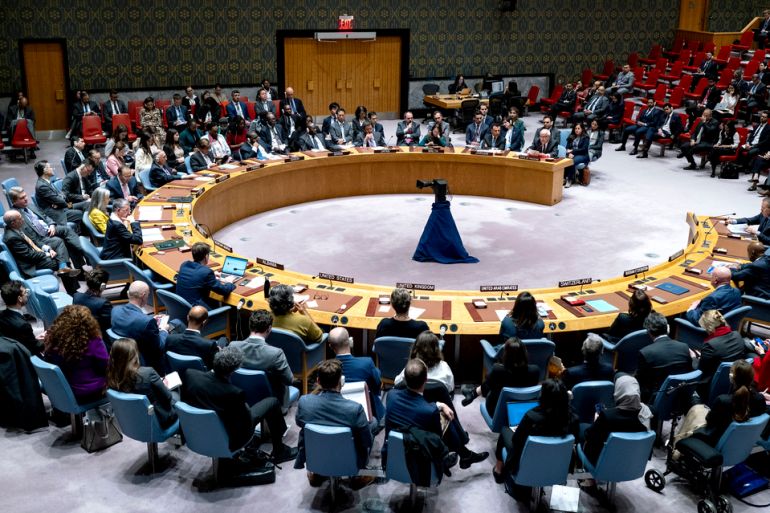US vetoes UN resolution calling for humanitarian pause in Israel-Hamas war
US ambassador says draft resolution did not do enough to underscore Israel’s right to self-defence.

The United States has vetoed a United Nations Security Council resolution that would have condemned Hamas’ attack on Israel while calling for a pause in the fighting to allow humanitarian assistance into Gaza.
The US was the sole vote against the resolution on Wednesday, with 12 members voting in favour and Russia and the United Kingdom abstaining.
KEEP READING
list of 3 itemsUN chief Guterres condemns ‘collective punishment’ of Palestinians
Israel says it won’t block humanitarian aid entering Gaza from Egypt
Russia’s top diplomat visits North Korea as battles rage in Ukraine’s east
“We are on the ground doing the hard work of diplomacy,” US Ambassador to the United Nations Linda Thomas-Greenfield told the council after the vote. “We believe we need to let that diplomacy play out.”
The Brazil-drafted text would have condemned violence against all civilians, but the US said that it did not do enough to underscore Israel’s right to self-defence. The US has typically exercised its Security Council veto to shield Israel from critical resolutions.
“The overwhelming majority of the council, 12 countries, supported that resolution and expressed disappointment after days of negotiations and a humanitarian situation that was rapidly escalating, that the council wasn’t able to come together and offer this view, this call for calm, this call for access for humanitarians,” Al Jazeera correspondent Kristen Saloomey reported from UN headquarters in New York City.
The vote came amid soaring tensions in the region, with crowds of protesters taking to the street in several countries after a deadly explosion at a hospital in Gaza on Tuesday drew widespread outrage.
Sign up for Al Jazeera
Americas Coverage Newsletter
Palestinian authorities said at least 471 people were killed in the blast that was caused by an Israeli air raid. Israel says the explosion was the result of a rocket launched by the Palestinian Islamic Jihad (PIJ) armed group misfiring. The PIJ has rejected the allegation.
The United States has said an analysis of “overhead imagery, intercepts and open source information” showed that Israel was not behind the attack and that the US would continue to collect evidence.
Al Jazeera was not able to independently verify the claims.
Despite the uncertainty around the cause of the explosion, protests across the Middle East have heightened concerns that other armed groups in the region could join the Israel-Hamas war.
Speaking before the council, UN Middle East peace envoy Tor Wennesland said that the world was “at the brink of a deep and dangerous abyss that could change the trajectory of the Israeli-Palestinian conflict, if not of the Middle East as a whole”.
An attack into southern Israel by Hamas on October 7, during which Palestinian gunmen killed hundreds of civilians in Israeli towns and kibbutzim and took 199 people captive, has been widely condemned.
Israeli authorities say at least 1,400 people, mostly civilians, were killed in the attack, and that more than 4,400 others were injured.
But Western countries, and especially Israel’s most firm ally, the US, have been accused of employing a double standard when it comes to potential Israeli violations of international law.
While the US has said that Israel should take steps to avoid killing Palestinian civilians, it has offered firm support and little direct criticism as Israeli air raids on Gaza level entire neighbourhoods, and as an Israeli siege cuts off access to water, food, electricity, and fuel for the strip’s 2.3 million inhabitants.
Palestinian authorities have said that more than 3,400 people have been killed and more than 12,000 others wounded in the Israeli assault on Gaza.
“Hamas’ own actions have brought this on – this severe humanitarian crisis,” said Thomas-Greenfield.
Russia, which drafted a failed resolution calling for a ceasefire earlier this week, said the US veto showed that US rhetoric about international law and human rights was self-serving, following months of criticism over Russia’s invasion of Ukraine.
“We have just been witnesses once again of hypocrisy and the double standards of our American colleagues,” said Russia’s UN Ambassador Vassily Nebenzia
